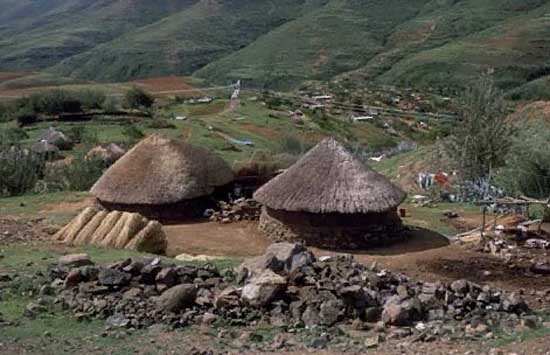
Sara Pugh boarded a plane to a small mountainous country completely surrounded by South Africa to work in the Community and Economic Development sector of Peace Corps Lesotho
Sara Pugh was born and raised in Indianapolis and graduated from Park Tudor School. She started thinking about the Peace Corps as a freshman at Tulane University.
"On a drive home from New Orleans to Indianapolis, I bought Beryl Markham’s book West with the Night. It’s about her life in Kenya as a poet, and it made me think more about Africa and how I want to go there. I also realized that everything could fit in the back of my car, which is a good time to pick up and move to Africa for two years," Pugh says in an e-mail message from Africa.
Just days after graduating with a bachelor of fine arts degree in glass art, she boarded a plane to a small mountainous country completely surrounded by South Africa to work in the Community and Economic Development sector of Peace Corps Lesotho. Nine weeks of training prepared Pugh for her new home in the Katse area of Lesotho. The winters are cold and harsh, she says, and the growing season is short.
She lives on an old contractors camp in a two-bedroom house with water and electricity. Unlike most volunteers, Pugh’s living situation means she’s not connected directly to a specific community. On a typical day, Pugh hitches a ride with someone heading toward the village of HaSashote, or hops in a packed van with a couple dozen others for the 20-minute ride. Upon her arrival, she makes small talk in Sesotho with the women selling food by the side of the road.
"We talk about what’s been going on since I last came to visit, things they’ve sold, people who have gotten sick, how the crops are doing, then make stuff," Pugh says. The former art student hones the women’s skills at creating handicrafts, the most profitable of which are candles sold to people in the villages surrounding HaSashote. They also knit jumpers and sweaters for schoolchildren, or make grass hats, baskets, place mats, clay houses, beads, bowls and cups.
The Peace Corps’ Community and Economic Development area concentrates on making the most of Lesotho’s available resources so that when Pugh leaves the village, the women will be able to continue their moneymaking art. For sustainability, Pugh teaches lessons in bookkeeping, pricing and ways to expand the market for buyers. The village women’s hard work is vital.
"The women are the primary caretakers," Pugh says. "And most of them are also the primary moneymakers in their families. Also due to the HIV/AIDS rate being so high in Lesotho – the recent official number for Lesotho was 31 percent infected – many women are also taking care of children who have been orphaned. There are funerals every weekend."
The men in Lesotho generally work as subsistence farmers, plowing and harvesting fields. Some families Pugh knows own stores, and the husbands run errands for the business, but that is not the norm. She says unemployed men in the rural villages hang out drinking and smoking. Other men work in mines in South Africa and come home only for Christmas. Some fathers go to the mines and never return. Others leave their mountain homes to work in the lowlands, where they may take a girlfriend, and their wives and children see little or none of his money.
Despite the significant role of women in Lesotho families’ economic survival, when asked if their voices are heard, Pugh scoffs.
"Voices heard where? There is a major problem with HIV in this country. If a woman tries to tell her husband to use a condom, will he? No. Or I highly doubt it. Children respect their mothers, but I do wonder where you are thinking their voices can be heard," she says.
"I know of one girl, 9 years old, who was raped by a boy in her village. She chose to tell her family, who brought up the matter to the boy’s family. Soon the entire village knew, and the girl was harassed by all of the boys in the village that she was wrong for telling anyone. She had to leave the village. He only got reprimanded. Are their voices heard? It’s an interesting question. Who is there to listen?"
Despite this sense of helplessness, Pugh refers to many of these things as the Lesotho way of life. "Confrontation and conflict are culturally acceptable," she says.
